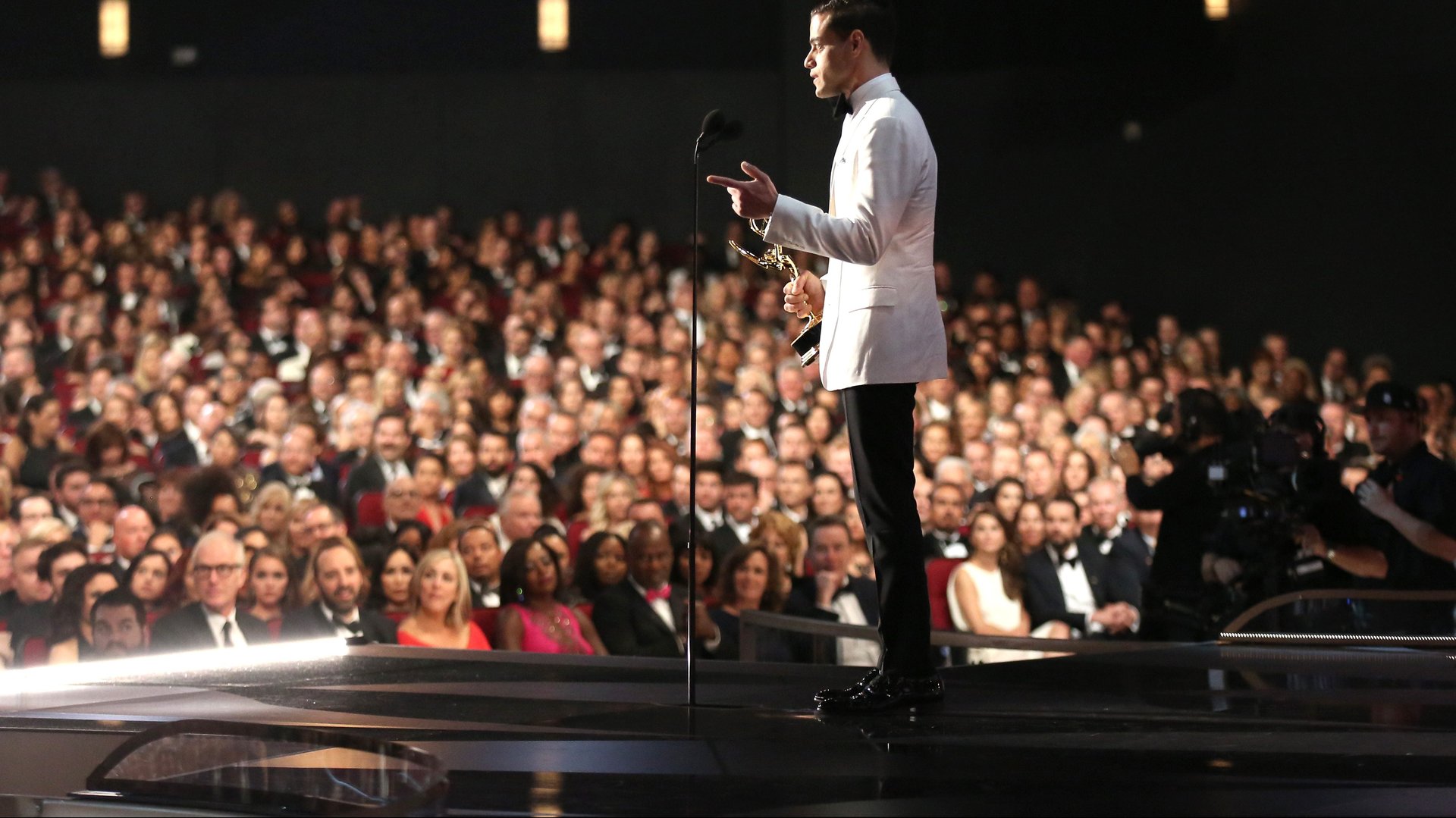Waiting in line for pasta: What it was like, poor and middle-aged, to play a millionaire on a hit TV show
“Make believe you’re the wealthiest people in the world,” the production assistant said.


“Make believe you’re the wealthiest people in the world,” the production assistant said.
I raised my wine glass and tried to imagine I was a finance mogul toasting a 10-million-dollar deal, but I couldn’t do it. I was an unemployed, 46-year-old Jewish guy earning 120 bucks for ten hours as a non-union extra on Mr. Robot, the TV show about hackers plotting to upend capitalism. I’d only taken three acting classes in my life. I didn’t even know how to pretend I was rich.
I stood with dozens of other background players on the balcony of a building near Chinatown in Manhattan. We were supposed to be upper one percenters at a party, unaware we were losing everything in a cyber-attack. The men wore suits and ties. The women were stunning in dresses and heels. A female violinist playing the theme from Titanic, foreshadowing our impending financial collapse.
“Did you bring homeless clothes?” a lady near me asked. Her sleeveless black dress clung to her dark, athletic body. She looked like a celebrity at a Whitehouse dinner.
“Homeless clothes?” I asked, confused. I had on a navy-blue suit and tie with black polished shoes. Nobody told me about a change of wardrobe.
“Some people had to bring them to play the same characters in a later scene.”
“Are they getting a better rate?” I asked, hopeful. I’d been desperate when the casting agency called, saying yes before considering tolls, gas, and taxes. I could use the additional pay.
“I think so,” she said.
Enthused, I thought about delivering a heart-wrenching performance as a broke, middle aged white guy. I’d remove my sport jacket, untuck my soaked dress shirt, and summon feelings about losing my marketing job and leaving my Upper East Side studio to live with my parents in New Jersey. Maybe I’d be lucky enough to get noticed for a speaking part.
“I should talk to someone,” I said.
“They would’ve told you when they called,” she said.
I sighed. After I got laid off, I quickly realized recruiters weren’t rushing to interview a 40-plus year old male with a music industry degree whose last job was in jewelry distribution. Desperate, I applied to everything from food service to retail, praying my luck would turn around. It didn’t.
Then, an actor friend suggested I do some background work. She said lots of shows were filming in the city, and people were frequently being pulled out of the crowd to say lines. This entitled them to vouchers and the possibility of joining the Screen Actors Guild.
“You have a look,” she said. “You never know what could happen.”
Now, standing in the blistering heat for more takes, my hopes of being picked seemed ridiculous. When the shooting finally ended, I walked into the church that functioned as the holding center, telling myself this was a waste of time.
Then I saw the food in steaming trays on long tables.
It was a feast large enough to feed every character on Game of Thrones, including the ones that had been killed off. I threw my jacket over a chair and rushed to the line.
“Are you SAG?” a crew member in jeans and a t-shirt asked. An ID hung from a chain around his neck.
“No,” I said.
“Sorry, union people first.”
I sat down and sulked. This was the kind of capitalist power play the writers of Mr. Robot were critiquing. I had been hired to act like a Master of the Universe, only to be dressed down by some kid who thought he was entitled to eat sooner because he was in some exclusive club.
I waited a few minutes before returning to the buffet. I took two plates and helped myself to paella, chicken cutlets, ravioli in pesto sauce, and heaping assortments of as much gourmet food as my eyes permitted. Dessert was cheesecake and key lime pie.
I carried my tray to a table, where an Asian woman who looked to be in her fifties was holding court with other performers.
“They just pulled me out of the crowd,” she said.
“That’s great,” another woman responded.
“Are you acting on the show?” I said.
“Yeah,” she said. “I’m a regular.”
“Really?” I said, surprised.
Her name was Micheleen. Portly, with a boyish haircut and a high-pitched voice, she’d started doing this for extra money, never intending to have a career. She got noticed, and now she was a recurring character on the show. An agent was sending her out for other roles.
I wanted the same thing for myself. As more people sat with us, it became clear everyone was hoping to get a break. The Russian acupuncturist covering a rent increase, the Chelsea art gallery manager looking for some new, an office assistant who felt stuck.
The food was the most filling and delicious I’d ever had. After I finished all of it, a production assistant made an announcement to form a line and sign papers to get paid. I arrived at the table and picked up a pen, telling her the number I’d been assigned earlier.
“You can go,” she said.
“You don’t need any more homeless characters?”
“Sorry,” she said.
I was a poor, middle aged guy, being rejected for the role of a homeless person on TV—and I hope the same thing will happen in my real life.